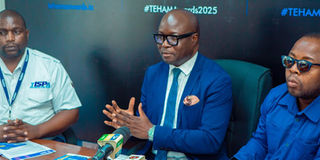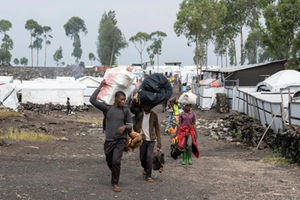How TEHAMA Awards 2025 could transform Tanzania’s digital economy

The ICT Commission Director General, Dr Nkundwe Mwasaga (centre), speaks to journalists on Friday, January 24, 2025, during the launch of the ICT Awards 2025 scheduled to take place on February 21, 2025, in Arusha. Right is Soft Ventures founding partner Daniel Mhina. PHOTO | COURTESY
What you need to know:
- The awards, they said, would celebrate digital transformation and innovation while setting the stage for unprecedented growth in the country’s ICT sector.
Dar es Salaam. The launch of the ICT Awards 2025 (TEHAMA Awards) marks a pivotal moment for Tanzania’s ambitions to become a leading digital economy in Africa, experts have said.
The development was announced on Friday, January 24, 2025 by the Ministry of Communication and Information Technology in partnership with the ICT Commission, Soft Ventures, and the Tanzania Internet Service Providers Association (TISPA).
The awards, they said, would celebrate digital transformation and innovation while setting the stage for unprecedented growth in the country’s ICT sector.
Scheduled for February 21, 2025, at the PAPU Building in Arusha, the event aims to recognise individuals, organisations, and initiatives driving progress in technology.
But beyond the celebration, experts believe it represents a broader strategy to propel Tanzania’s digital economy forward.
The awards align closely with Tanzania’s Digital Economy Strategy, launched to position the country as a hub for technology, innovation, and digital trade.
The strategy focuses on creating an enabling environment for innovation, enhancing ICT infrastructure, fostering digital literacy, and promoting private sector participation.
The ICT Commission Director General, Dr Nkundwe Mwasaga, emphasised the transformative potential of the awards.
“Recognising excellence in ICT is not just about celebrating achievements; it’s about motivating innovators to push boundaries and create solutions that encourage economic growth,” he said.
Dr Mwasaga highlighted that ICT is no longer a luxury but a necessity in modern economies.
“From streamlining business processes to enabling e-government services, ICT is transforming Tanzania’s economy. These awards provide a platform to accelerate this transformation by fostering collaboration and innovation,” he added.
The role of ICT awards in driving economic transformation has been proven in countries like Rwanda and India.
Rwanda’s annual Smart Rwanda Days, for instance, have significantly boosted the adoption of e-governance and digital skills development, making the country a leader in ICT adoption in Africa.
Similarly, India’s Digital India Awards have promoted innovation in public services, resulting in enhanced efficiency and citizen engagement.
These initiatives have attracted global tech giants, further strengthening their digital economies.
“This approach could yield similar results in Tanzania,” said an ICT and innovation expert at the University of Dar es Salaam, Mr Benard Simba.
“The awards could encourage healthy competition among innovators, attract investment, and enhance the visibility of Tanzanian tech solutions globally,” he added
With 10 main categories and 22 awards, including “Innovation in ICT Products or Services,” “ICT for Social Impact,” and “Women in ICT,” the awards are set to spotlight diverse contributions.
Applications are open until February 10, 2025, through the official website.
“This diversity ensures inclusivity, motivating individuals and organisations across various sectors to participate,” said Soft Ventures founding partner Daniel Mhina.
He added, “Such recognition fosters a culture of excellence and inspires more people to explore the potential of ICT.”
Local entrepreneur Sarah Mwambole, who runs a tech startup in Dar es Salaam, said the awards would motivate young innovators.
“Being recognised at a national level will boost confidence and open doors to partnerships. It’s a game-changer for startups like ours,” she noted.
Experts believe the awards can serve as a bridge between policymakers, industry leaders, and innovators.
By fostering dialogue and collaboration, they can address pressing challenges such as digital infrastructure gaps, limited access to finance for startups, and inadequate digital skills.
The Director of Information Systems Development at the Ministry of Communication and Information Technology, Mr Mohamed Abdi Mashaka, said: “The awards will act as a catalyst for collaboration, bringing together stakeholders to create a thriving digital ecosystem. It’s a step towards realising our vision of becoming a digital economy.”
As Tanzania prepares for the TEHAMA Awards 2025, the focus remains on ensuring the event’s long-term impact.
Experts suggest that sustained efforts, combined with initiatives like the awards, could see the country emerge as a regional tech hub.
“Tanzania has the potential to lead Africa in digital transformation. But it requires consistent investment, recognition of talent, and the right policies to create an enabling environment,” said Mr Simba.





